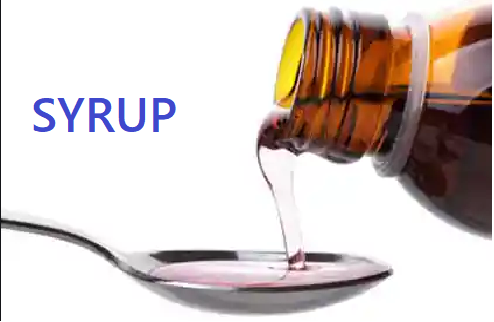MFR of Ferric Ammonium Citrate & Folic Acid Syrup
PURPOSE: This Master Formula Records (MFR) is written to describe the formulae, manufacturing procedure, specifications, packing details of dosage form.
SCOPE: This MFR is performed and is applied during the manufacturing of dosage form.
RESPONSIBILITY / ACCOUNTABILITY: It is the responsibility of Manufacturing Chemist to follow and adhere to this SOP. The Production Pharmacist, The QA Manager, The QC Manager and cGMP Administrator are accountable for the strict adherence to the master formula.
COPY ISSUED TO:
- Master Copy : Manager Quality Assurance
- Copy No. 1 : Production Pharmacist
- Copy No . 2 : Manager Quality Control
- Copy No . 3 : cGMP Administrator
- Copy No. 4 : Liquid Section

| PRODUCT NAME:Ferric Ammonium Citrate & Folic Acid | BATCH SIZE: 1000 LTRS. |
| PRODUCT REFERENCE CODE: | UNIT SIZE: 200 ml |
| GENERIC NAME: N.A. | PACK SIZE: 30 x 200 ml |
| DOSAGE FORM: SYRUP | STRENGTH: N.A. |
| DEPARTMENT: LIQUID DEPARTMENT | EXPIRY DATE: AFTER 18 MONTHS FROM THE DATE OF MANUFACTURING |
COMPOSITION:
Each 15 ml contains:
Ferric Ammonium Citrate I.P. 250 mg Cynocobalamin I.P. 5 mcg
(Equ.to elemental Iron 50 mg) Sorbitol Solution (70%) I.P. 1.5 gms
Folic Acid I.P. 0.5 mg
EQUIPMENTS TO BE USED:
| SR. NO. | NAME OF EQUIPMENT | ASSEMBLING
AS PER SOP NO. |
CLEANING
AS PER SOP NO. |
| 1 | Sugar Syrup Manufacturing Tank | ||
| 2 | Sugar Storage Tank | ||
| 3 | Charging Tank – III – 1000 Ltrs. | ||
| 4 | Filter Press | ||
| 5 | Storage Tank – I – 1000 Ltrs | ||
| 6 | Linear Bottle Washing Machine | ||
| 7 | Digipack Bottle Filling And Sealing Machine | ||
| 8 | Automatic Bottle Labelling Machine |
Raw Material
| S.NO. | INGREDIENTS | STD | Theoretical Quantity Req. | Overages % | Total Quantity Used |
| 1. | CITRIC ACID | I.P. | 0.200 | 0.200 KGS | |
| 2. | FOLIC ACID | I.P. | 0.033 | 50.00 | 0.050 KGS |
| 3 | FERRIC AMMONIUM CITRATE | I.P. | 16.666 | 9.50 | 18.249 KGS |
| 4 | ORANGE FLAVOUR | F.G. | 2.500 | 2.500 LTRS | |
| 5 | SODIUM BENZOATE | I.P. | 5.000 | 5.000 KGS | |
| 6 | SORBITOL SOLUTION | I.P. | 100.000 | 100.000 KGS | |
| 7 | SUGAR | F.G. | 500.000 | 500.000 KGS | |
| 8 | SODIUM HYDROXIDE PELLETS | I.P. | 0.010 | 0.010 KGS | |
| 9 | VITAMIN – B12 | I.P. | 0.334 | 100.00 | 0.668 GMS |
Packing Material
| S.NO. | NAME OF THE MATERIAL | THEORETICAL QUANTITY REQ. | FOR
RECORD |
TOTAL QUANTITY USED |
| 1. | 200 ML AMBER ROUND BTLS | 5000.000 | 5000.000 NOS | |
| 2. | ADHESIVE TAPE ROLL BROWN | 4.00 | 4.000 NOS | |
| 3 | CORRUGATED BOX F- 05 | 166.666 | 166.66 NOS | |
| 4 | UNIT CARTON | 5000.000 | 2.00 | 5002.00 NOS |
| 5 | LABEL | 5166.666 | 3.00 | 5169.666 NOS |
| 6 | GUM ACCACIA | 1.000 | 1.000 KGS | |
| 7 | PILFER PROOFS CAP – 25 MM | 5000.00 | 5000.000 NOS |
MANUFACTURING SPECIFICATION:
Average fill of each Bottle is 200 ml.
Volume variation limit allowed in each filled Bottle is 200 ml to 201 ml.
Make up the final volume of the syrup accurately.
Filter the completely charged batch using Filter Press L-21 by operating it as per its SOP.
Transfer the syrup from charging tank L-08 to storage tank L-12 after complete charging of batch.
Mix the batch, Fill the bottles and also perform the primary packing of bottles at temperature not more than 250 C and Relative Humidity not more than 40.
Yield:
Theoretical Yield is 5000 Bottles.
Expected Practical Yield is 5000 + 2% Bottles.
Packing Details:
Wash the bottles on Linear Bottle Washing Machine L-24 and operate it as per its SOP.
Transfer the Syrup from storage tank to Digipack Bottle Filling and Sealing Machine for filling and sealing of the bottles as per its SOP.
Fill 200 ml syrup in amber glass brute bottle and use 25 mm PP Cap to seal the bottle mouth.
Inspect the each filled and sealed bottle for proper sealing and presence of the foreign particles, if any.
Label every inspected bottle by using the Automatic Bottle Labelling Machine L-26.
Pack each filled and sealed bottle in unit carton individually.
Pack 30 unit cartons in specified corrugated box F-05 to give a pack size of 30 x 200 ml.
Seal each corrugated box with adhesive tape and label it properly by affixing the specified label.
MANUFACTURING PROCESS:
I) Preparation of Sugar Syrup:
Take Purified water 150 Ltrs into Stainless Steel Steam Jacketed Sugar Syrup Preparation Tank.
Run the steam into the jacket so as to heat the water.
Add 500 kgs of sugar into the tank and start stirring by operating the tank .
Heat continuously till the sugar dissolves completely to give uniform Sugar Syrup.
Transfer the prepared Sugar Syrup to Sugar Syrup Storage Tank L-04 through transfer pump.
Transfer the prepared Syrup from Sugar Syrup Storage Tank to Charging Tank L-08 through transfer pump.
II) Addition of Ingredients into the Charging Tank L-08 while stirring continuously:
Dissolve 5.0 kgs of Sodium Benzoate in 20.0 Ltrs of water and add to the bulk batch.
Dissolve 0.200 kgs of Citric Acid in 2.0 Ltrs of DM water and add to the bulk batch.
Add 100.0 kgs of Sorbitol Solution to the bulk batch.
Dissolve 18.249 kgs of Ferric Ammonium Citrate in 70 Ltrs of DM water and add to the bulk batch.
Dissolve 0.668 gms of Vitamin B 12 in 3.0 Ltrs of DM water and add to the bulk batch.
Now perform the following:
Take 2.0 Ltrs of water in a Stainless Steel Container.
To this water add 1.0 gms of Sodium Hydroxide Pellets and stir it to dissolve completely.
To this solution add 50.0 gms of Folic Acid and stir well till a clear solution is obtained.
Now add this solution to the bulk batch.
Add 2.5 Ltrs of Orange Flavour to the bulk batch.
Make up the volume with DM water to 1000 Ltrs and mix until homogeneous.
Check the pH of Solution to be in between 5.5 – 6.5.
Filter the batch through Filter Press L-21 by operating it as per its SOP and transfer it to the Storage Tank L-12.
Send the sample to Quality Control Department for bulk testing.
IN-PROCESS CONTROLS:
The following in-process controls should be maintained during the processing:
Check Raw materials used for manufacturing purpose are all approved materials and have ‘Released’ labels fixed on it.
All weighed Raw materials should be counter-checked by Assistant Manufacturing Chemist. If any discrepancy is noticed, it should be immediately brought to the notice of Production Pharmacist and QC/QA Manager.
Physical characteristics of Raw material like colour, odour, and consistency are checked before compounding.
Final volume should be made as per Standard Operating Procedure using correct dipstick in the Assistant Manufacturing Chemist.
pH of the bulk should be checked and it should be with in specified limits.
Bulk sample should be sent for analysis to Quality Control Department before starting the filling and sealing stage.
Intermittently filled volume should be checked at 30 minutes interval by the Assistant Manufacturing Chemist and record for the same should be kept in Batch Manufacturing Record.
The net volume should be checked for all the filling nozzles and in no case, net volume should be less than volume claimed on the label.
Limit for Volume Variation: Volume claimed on the label + 2ml
Visual inspection of filled and sealed bottles should be done as per SOP and the record of the same should be kept in the Batch Manufacturing Record.
Suspensions should be filled under constant slow speed stirring to maintain uniformity of contents.
The labels and cartons should be checked thoroughly for proper batch coding.
Intimation should be sent to Quality Control Department for finished product sampling and testing.
After the completion of labelling and packaging, the coded labels and cartons should be accounted for and rejected printed material should be destroyed in the presence of QC/QA Manager. Maintain the destruction of the same in the Batch Manufacturing Record.
It will be ensure that filling or packaging equipment has been properly cleaned.
Filling or packaging of next product should not commence until the ‘Line Clearance’ has been given by the IPQA.
MFR of Dextromethorphan,Chlorpheniramine,Bromhexine & Guaifenesin Tablets
